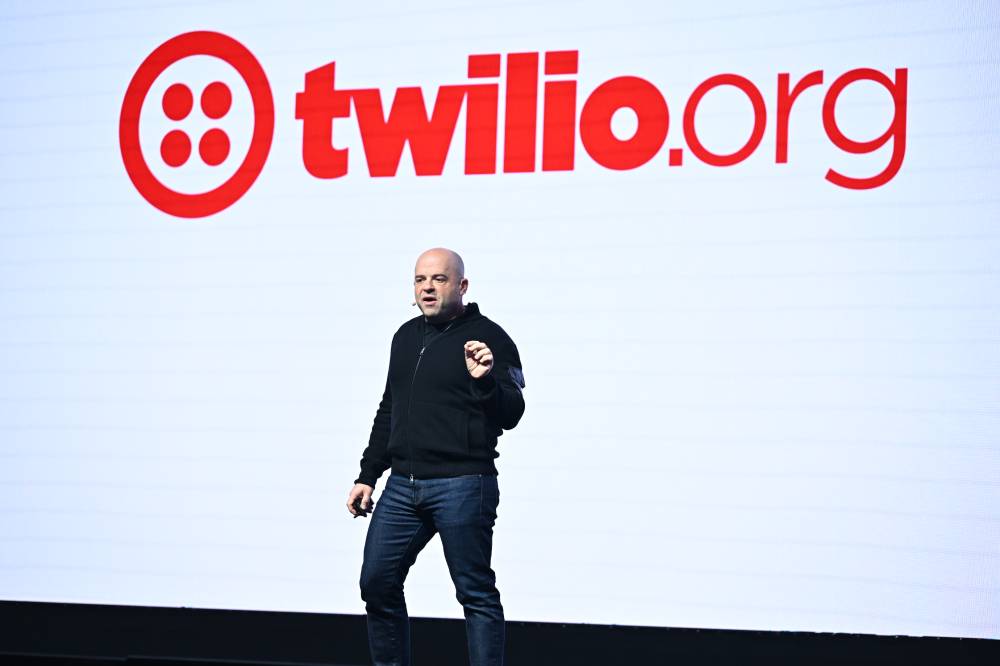Deploy AI, create your army of ‘magical’ employees

SINGAPORE—An American software company is deep-diving into the heart of artificial intelligence (AI) to empower businesses with generative and predictive AI capabilities to connect the dots and gain better understanding of customers.
Established in 2008, San Francisco-based Twilio knows all about customer experience, drawing insights from more than a trillion customer interactions every year. Its customer engagement platform is used by 306,000 businesses worldwide to create personalized experiences for their clients. Key products include Twilio Engage, Flex and Segment.
In the Philippines, its clients include Union Bank of the Philippines, Lalamove and Zalora. UnionBank employs Twilio Flex, a programmable cloud contact center platform that gives organizations complete control of how, when and what to deploy. Aided by Twilio Professional Services, the implementation of this programmable contact center resulted in an optimal interface that helped UnionBank assist customers better. This led to a 55-percent increase in self-service automation and reduced average handling time.
Transportation and logistics company Lalamove requires email and phone verification for user registration process. It uses Twilio’s programmable messaging for WhatsApp and SMS to deliver one- time password (OTPs) to users. Also, some driver partners switch to other channels to receive messages like OTPs, leading them to drop out of the onboarding process. To prevent this, Twilio’s robocalling and programmable voice can read the OTP for the driver partners so that they can seamlessly input it into their chosen channel.
Ecommerce platform Zalora mainly uses Twilio’s customer data platform Segment, which offers a complete toolkit to standardize data collection, unify customer records and route data into any system where it’s needed. It personalizes customer experience without sacrificing privacy.
Mining data
Now, Twilio aims to utilize AI to create an army of “magical employees” that will serve the customer in every point of the journey. The software company will leverage on the personalization of data to give customers unique experiences that will translate to customer retention thus, boosting the bottom line of companies.
Jeff Lawson, CEO and cofounder of Twilio, likens the “magical employee” to an assistant who works for the customer all the way.
At Twilio’s SIGNAL, its annual customer and developer conference held here on Nov. 15, Lawson announced their partnership with OpenAI. Boosted by OpenAI’s GPT-4, Twilio launched CustomerAI—a technology layer that unlocks generative and predictive capabilities. This engine activates customer data and adaptive engagement in Twilio Engage, Flex and Segment.
Twilio’s CustomerAI combines the power of large language models with the rich customer data that flow through Twilio’s customer engagement platform. It focuses on four areas: enriching Twilio Segment’s ‘golden profiles’ or customer records that businesses can use to power interactions; transforming the contact center; optimizing personalized marketing experiences; and visualizing and controlling critical customer metrics.
“You have to start training [CustomerAI], teaching it about your company. So you start with knowledge. Then the second thing you’re going to do is to give it access to tools. Then you give it guardrails. You’re gonna tell it things it should not be doing. But it’s not yet smart. It doesn’t know who it is talking to,” he explains.
This is where CustomerAI comes into play. The engine will mine all the relevant available historical data about a customer and store it in a profile. So when CustomerAI speaks to a customer, it can use all the data and create a highly personalized conversation.
Lawson cites a real-life example. “This magical employee will take all that raw data and turn it into an understanding, like [knowing that] Jeff tends to like black T-shirts and he’s not interested in buying women’s hats. And he tends to shop on the weekends and likes the fast shipping option. This will be an understanding of me, not just raw data,” he explains.
CustomerAI will never forget these things. Rather, it will store these data for future use. “This type of information is just lost in history. Nobody remembers this, except for CustomerAI,” he says.
Aside from being a treasure of trove of information, this new technology can also create marketing campaigns for business. Lawson says that CustomerAI can simplify the task of launching campaigns—which usually take time for companies to organize—with just a click of a button.
“You can tell it to use Google to re-target shoppers who viewed running shoes but haven’t purchased; send a follow-up email if they don’t convert from the ad. Then click the button and AI can create that journey for you,” he explains.
Human touch
What role will humans play if CustomerAI can do almost anything? Lawson says that the marketers will still have full control of the idea of the journey they want to run.
“But if you have an AI that has all the data about your customers and their behaviors, it will design the journey for you. It will [guide] the flow of the email, write the email for you, create the visuals for you. It can do all of these with just [having] the basics of what you are trying to accomplish,” he adds.
Even emails and messages will be overhauled. Lawson explains that a technology that knows everything about its customer base will result in a super-targeted and highly optimized messaging.
In addition, CustomerAI can also help protect customers from SMS attacks, spam messages and fraudsters through Verify API. This technology can add multichannel verification to apps or websites while relying on trusted carrier data to authenticate the background.
To improve communication with clients or even teams, CustomerAI perception engine can capture the most important details of every kind of conversation. It helps employees become more effective and efficient in serving customers by providing accurate and relevant information.
Lawson agrees that all of these may sound frightening at first. This is why they created trust principles for CustomerAI to ensure that it can only be used within certain parameters.
“We provide transparency about our use of AI and give our customers the ability to control their data. We select responsible AI vendors and help our customers use AI in a way that respects privacy, keeps data secure and minimizes the risk of bias. We monitor the functioning of AI to address harm and fitness for purpose in partnership with our AI vendors and customers,” he says.
“I feel like this is day zero of AI. Now, I am confident that one of the amazing uses of AI will be to build better companies … They are going to become 10 times better in serving their customers. And they are going to do it at one-tenth of the cost. And that will be a game-changer for every single industry,” he adds. -VANESSA B. HIDALGO


















